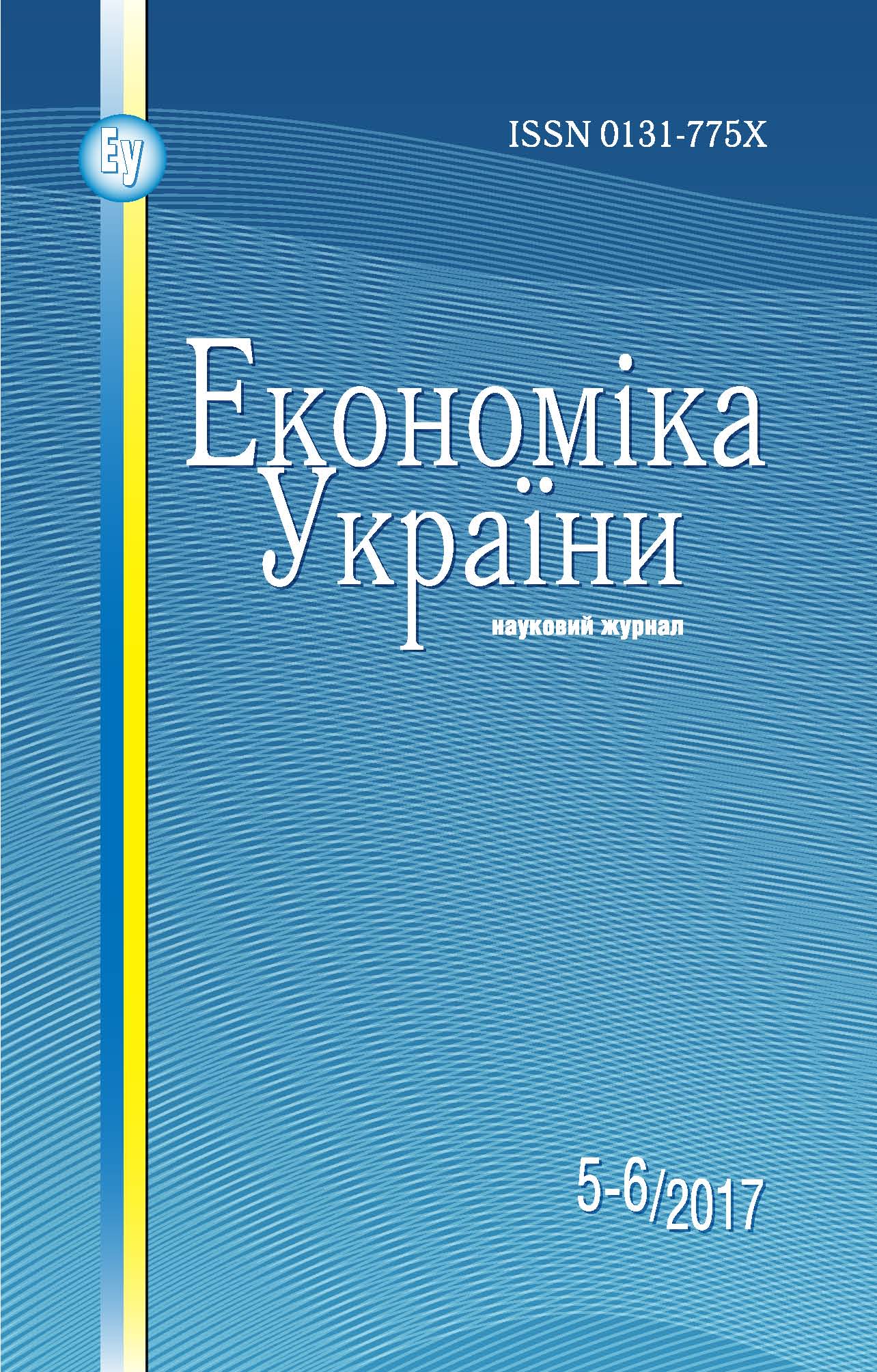LOGICAL AND HISTORICAL BASES OF CARDINAL ECONOMIC CHANGES AND TRANSITION TO RECONSTRUCTIVE DEVELOPMENT
Abstract
The logical and historical bases of changes in trade policy and other cardinal economic change are revealed. These foundations lie in deploying the internal contradictions of jointly-divided labor. At the present stage of the development of society, this has incarnated in contradictions between globalization, which is carried out through information, technological, financial and economic mechanisms and is subjectively represented by multinational corporations, and localization, which is carried out through spatial-territorial forms and is subjectively represented by national states.
The forms of manifesting this contradiction are analyzed. It is shown that for its solution it is necessary to coordinate global and local reproduction cycles at all levels - from the largest TNC to the settlement of the poorest country. Incoordination of such cycles generates uncontrolled migration flows of labor, material and financial resources, which, in turn, generates crisis phenomena of a various nature.
Overcoming of these contradictions is possible on the way of transition to a reconstructive type of development and search for adequate mechanisms of management. It is concluded that the solution of problems of stable equilibrium development should be based not on purely economic approaches with their principles of rationality and efficiency, but on economic ones, which give priority to not rationality and efficiency (although they are not excluded), but to the integrity of the reproduction of the country\'s economic life.
The characteristic of the essence and general mechanisms of reconstructive development is given, as well as their relationship with local mechanisms. It is shown that the mechanism of reconstructive development combines planned reflection (mutual disclosure of a need and an object of its satisfaction), neoclassical and Keynesian instruments of influence on supply and demand on the basis of institutional means of correction of conformity of needs and demand (on the one hand) and resources and supply (on the other)
References
Kolodko Grzegorz W. Kuda Idet Mir: Politicheskaya Ekonomiya Budushchego [Where the World is Going: the Political Economy of the Future]. Moscow, Magistr, 2014 [in Russian].
Reinert E.S. Kak Bogatye Strany Stali Bogatymi, i Pochemu Bednye Strany Ostayutsya Bednymi [How Rich Countries Got Rich ... and Why Poor Countries Stay Poor]. Moscow, PH of the State University – High School of Economics, 2011 [in Russian].
Sledz’ S. Erik Reinert: “Ne robit’ te, shcho vam kazhut’ robyty amerykantsi, a robit’ te, shcho amerykantsi robyly sami…” [Erik Reinert: “Don’t do what the Americans tell you to do, but do what the Americans did themselves…”], available at: gazeta.zn.ua/business/erik-raynert-ne-delayte-to-chto-vam-govoryat-delat-amerikancy-a-delayte-to-chto-amerikancy-delali-sami-_.html [in Ukrainian].
Il’enkov E.V. Chto takoye lichnost' [What an identity is], available at: www.bellabs.ru/Books/Person/Um-2.html [in Russian].
Gritsenko A. Institutsional’naya Politicheskaya Ekonomiya: Predmet, Metodologiya, Soderzhaniye [Institutional Political Economy : Subject, Methodology, Content]. Saarbrucken, Deutschland: LAP LAMBERT Academic Publishing, 2014 [in Russian].
Grytsenko A. Ekonomika Ukrainy na shlyakhu do inklyuzyvnoho rozvytku [Ukraine's economy on the road to inclusive development]. Ekonomika i prognozuvannya – Economy and Forecasting, 2016, No. 2, pp. 9–23 [in Ukrainian].
Hegel G.V.F. Nauka Logiki. T. 2 [Science of Logic. Vol. 2]. Moscow, Mysl’, 1971 [in Russian].
Smith A. Issledovanie o Prirode i Prichinakh Bogatstva Narodov [An Inquiry into the Nature and Causes of the Wealth of Nations]. Moscow, Eksmo, 2016 [in Russian].
Scott R.E. Heading South: U.S. – Mexico Trade and Job Displacement after NAFTA. Washington, DC, Economic Policy Institute, 2011, May 3.
Bivens J. Using Standard Models to Benchmark the Costs of Globalization for American Workers without a College Degree. Washington, DC, Economic Policy Institute, 2013, March 22.
Krugman P. Trade, Labor, and Politics. New York Times, 2016, March 28.
Eshchenko P.S. Ukrainskaya “Velikaya Depressiya” i Kak iz Nee Vyiti? [Ukrainian “Great Depression” and How to Get out of It? ]. Kiеv, PH “Dakor”, 2017 [in Russian].
Khozyaystvo i Mysl’. Yubileinyi Monograficheskii Sbornik [Economy and thought. Jubilee Monographic Collection]. Yu.M. Osipov, E.S. Zotova (Eds.). Moscow, TEIS, 2015 [in Russian].
Grytsenko A. Rekonstruktyvnyi ekonomichnyi rozvytok: zmist, osnovni napryamy i vektor sotsial’noi spravedlyvosti [Reconstructive economic development: contents, guidelines and the vector of social justice]. Ekonomichna teoriya – Economic Theory, 2016, No. 4, pp. 5–18 [in Ukrainian].
Heyets V.M. Osoblyvosti vzaemozv’yazku ekonomichnykh i politychnykh peredumov rekonstruktyvnoho rozvytku ekonomiky Ukrainy [Peculiarities of interrelation of economic and political preconditions of a reconstructive development of Ukraine’s economy]. Ekonomika Ukrainy – Economy of Ukraine, 2016, No. 12, pp. 3–21 [in Ukrainian].
Hegel G.V.F. Entsiklopediya Filosofskikh Nauk. T. 1. Nauka Logiki [Encyclopedia of Philosophical Sciences. Vol. 1. Science of Logic]. Moscow, Mysl’, 1974 [in Russian].
Shvab K. Chetvertaya Industrial’naya Revolyutsiya: vyzovy i vozmozhnosti [The Fourth Industrial Revolution: challenges and opportunities], available at: guralyuk.livejournal.com/2051302.html [in Russian].
Grytsenko A. Systemna kryza yak naslidok bazovoi destruktsii ekonomiky Ukrainy i shlyakhy ii podolannya [Systemic crisis as a result of base destruction of Ukraine's economy and ways to overcome it]. Visnyk NBU – Herald of the National Bank of Ukraine, 2014, No. 5, pp. 24–28 [in Ukrainian].
Hegel G.V.F. Nauka Logiki. T. 1 [Science of Logic. Vol. 1]. Moscow, Mysl’, 1970 [in Russian].
Downloads
Published
How to Cite
Issue
Section
License
Copyright (c) 2024 Economy of Ukraine

This work is licensed under a Creative Commons Attribution-NonCommercial-NoDerivatives 4.0 International License.



